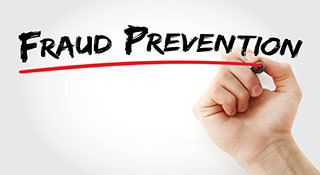Crucial Tactics for Fraud Prevention

As scams constantly evolve, identifying them becomes increasingly challenging. Regrettably, businesses suffer a median loss of $150,000 per year due to fraud, as reported by the Association of Certified Fraud Examiners. This substantial sum could profoundly influence a small business's trajectory, potentially steering it toward collapse.
By offering guidance on how to identify fraudulent scams and how to steer clear of them, we hope to help business owners to protect themselves from potential financial pitfalls and losses.
Common Fraud Tactics and How to Protect Yourself
Phishing Scams
Phishing is the practice of sending email or text messages that look to be from real companies or individuals, inducing the recipient to reveal information, including passwords, credit card information, or other identification data. These messages often have harmful links or files that, if opened, can install viruses, steal data, or get people to share private information without realizing it. Remember you want to protect any information you may have related to your customers and employees especially if you retain any personal identifiers or other confidential information.
Before sharing sensitive information or making payments, it's essential to confirm the credibility of the recipient in any financial request. Common red flags to watch for include spelling and grammatical errors, or suspicious links. It’s always best to verify email addresses, contact information, and company details before moving forward.
Wire Fraud
Wire fraud often traps individuals or businesses through deceptive tactics, luring them into wire-transferring funds into fraudulent accounts rather than the account for which the money is intended.
A critical red flag indicating potential wire fraud includes last-minute changes to wiring instructions, especially changes in account numbers. Verification is key to help mitigate the risk of wire fraud. This means vetting all emails or forms of communication and relying on direct contact with your vendors, lender or closing attorney to verify account numbers and amounts. Be sure you understand the full process of closing and wiring instructions before transferring funds.
Credit Card Skimming / Hacked Fuel Pumps and ATMs
Scammers are developing more sophisticated tactics to steal information. Nationwide reports in the U.S. highlight the emergence of Bluetooth-enabled skimmers, compact devices installed on card readers that collect card numbers and personal identification numbers (PIN). These present a threat when concealed at fuel stations and ATMs. This scam poses significant risk to transportation fleet owners, potentially leading to the theft of card information and leading to unauthorized charges.
Even with drivers conducting a visual inspection at fuel stations, there remains a risk of overlooking these skimmers. A fuel card program with fraud prevention can save on the cost of fuel and ensure an extra layer of security. Commercial Credit Group offers a fuel card that can help monitor and manage costs and comes with built-in fraud protection software.
Fraudulent Payment Request for UCC Filings
Most lenders file a Uniform Commercial Code (UCC) filing when they finance an asset or group of assets. These UCC filings are public information filed with the various state offices and simply indicate that the lien holder has a security interest in the asset(s). The identity of the asset owner is also listed on the UCC filing.
Because this is public information, anyone, including scam artists, can access the data. A common scam involves mailing or texting asset owners falsely demand payment for a copy of the UCC statement.
If you receive such a letter or text, contact your lender to let them know. It's also advisable to report any such solicitations to your state's filing office.
Scam Equipment Listings and Sales:
There are a lot of online auction and equipment sales sites, and most of them are legitimate. However, there are also many sites designed to scam potential equipment buyers. Deceptive online platforms or marketplaces promote equipment at appealing prices and often use real company names to look legitimate. In many cases, the equipment being advertised isn’t actually for sale or simply doesn’t exist. Individuals unaware of the scam might make payments for machinery that either doesn’t exist or never gets delivered. To avoid this type of scam, you can do the following:
Research and Verify – Before purchasing any equipment, it is important to conduct a comprehensive search on the seller, the platform, and the equipment. Verify the legitimacy of the website and any email addresses associated with the site. Check the site security. If the URL does not have a https prefix, the site is not secure. For the equipment, ask for product specifications such as the year, serial number, and machine ID. One red flag is pricing which seems to be very low. If the price appears to be an "unbelievably good deal", it's completely reasonable to question its authenticity.
Inspect Equipment Before Purchase – For high-value items, if possible, equipment inspections are an important extra step for a buyer’s protection. If the seller refuses to let you inspect the equipment, that’s another red flag.
Use Secure Payment Methods –Never send cash, cashier’s check or pay via wire transfer unless you are absolutely certain of the legitimacy of the seller. If paying via credit card, make sure the business card you are using has built-in security measures. This enhances the safety of your financial transactions and minimizes the risk of fraudulent activities. Additionally, some credit card companies will help you get your money back if you never receive the item in question.
Identity Theft
Identity theft is not limited to theft of an individual’s identity. A growing trend involves fraudsters assuming a trucking company's identity. This can be in the form of illegitimate use of the motor carrier’s designated U.S. Department of Transportation (DOT) number. With access to this, fraudsters can impersonate trucking companies, arrive to collect the freight, and subsequently vanish with the cargo.
A way to prevent this is to routinely access the Federal Motor Carrier Safety Association (FMCSA) portal to review the status of the carrier’s authority and safety record.
Steps To Take When You’ve Been Victim of Fraud
Upon recognizing that you've been the victim of fraud, initiate contact with relevant government, banking, and credit institutions to notify them of the crime and halt any continued theft.
- Notify your banking partners and lenders - They can assist and might have specific protocols in place to handle such incidents, potentially mitigating financial implications.
- File a complaint - Report the data breach or compromised information to the appropriate authorities:
- The Federal Trade Commission (FTC)
- Local law enforcement agencies
- If this is specifically related to identity theft of a transportation company, you can report the incident to the U.S. Department of Transportation’s (USDOT) Office of the Inspector General (OIG) Hotline
- Filing a formal complaint creates a record of the incident and might aid in investigations or legal actions against the perpetrators.
Takeaways
To protect yourself and your business, you must remain well-informed and vigilant about fraudulent tactics, and ensure that your business has implemented necessary data security measures to prevent cyber-attacks and data breaches. It is equally critical to maintain direct and transparent communication with your financial service providers. A relationship built on trust and open dialogue can mitigate damage should an incident occur.
You should consult an expert to look at your systems and operation and help insulate your business from the numerous risks. Look for a company that will review your security and provide you with some guidance on how to best secure your systems.
An additional way to protect yourself is to consider Cyber Insurance to provide protection for data breaches and theft of confidential information.
If an incident does occur, it’s equally critical to alert the authorities to help shut down the perpetrators.
Additional Resources:
Freight Fraud Trends: Warning Signs and Insurance Insights
Protecting Personal Information
Subscribe to Our Blog
Want to know when our blog has been updated with new posts?
Complete our short form and we’ll make sure you are informed.

Fill out our short form to subscribe




















